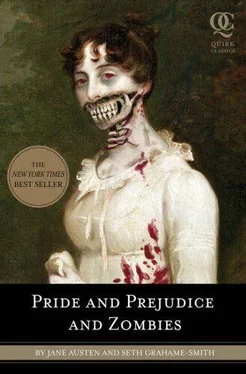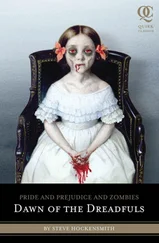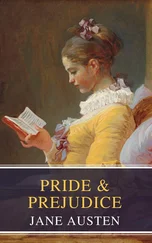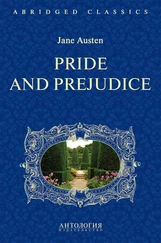I had not been long in Hertfordshire, before I saw, in common with others, that Bingley preferred your elder sister to any other young woman in the country. But it was not till she took ill and remained at Netherfield that I had any apprehension, for knowing of her occupation as a slayer of the undead, I was certain that she had been stricken with the strange plague. Not wishing to trouble you or any of the Netherfield party with my theory, I endeavoured to smother Bingley’s affections, thus sparing him the agony of watching your sister succumb. Upon her recovery, which I expected to be temporary, I perceived that his partiality for Miss Bennet was beyond what I had ever witnessed in him. Your sister I also watched. Her look and manners were open, cheerful, and engaging as ever, but I remained convinced that she would soon begin the cheerless descent into Satan’s service. As the weeks turned to months, I began to question my observations. Why had she not yet turned? Could I have been so wrong as to mistake a simple fever for the strange plague? By the time I realised my error, it was too late to affect any undoing of the scheme. Mr. Bingley had been quite separated from Miss Bennet, both in distance and affection. Though I did so without malice, my actions have surely pained your sister, and your resentment has not been unreasonable. But I shall not scruple to assert, that the severity of your sister’s cold was such as might have given the most acute observer a conviction that, however amiable her temper, her heart was pledged to darkness. That I was desirous of believing her stricken is certain-but I will venture to say that my investigation and decisions are not usually influenced by my hopes or fears. I did not believe her to be afflicted because I wished it; I believed it on impartial conviction, as truly as I wished it in reason. But there were other causes of repugnance. These causes must be stated, though briefly. The situation of your mother’s family, though objectionable, was nothing in comparison to that total want of propriety so frequently betrayed by herself, your three younger sisters, and even by your father. Pardon me. It pains me to offend you. But amidst your concern for the defects of your nearest relations, let it give you consolation to consider that you and your elder sister are held in my highest esteem, both in manners and skill as fellow warriors. I will only say farther that from what passed that evening, that my opinion of Miss Bennet being stricken was confirmed by her failure to join us in the investigation of the unfortunate kitchen incident, and my will strengthened to preserve my friend from what I esteemed a most unhappy connection. He left Netherfield for London, on the day following, as you, I am certain, remember, with the design of soon returning.
The part which I acted is now to be explained. His sisters’ uneasiness had been equally excited with my own, though for different reasons; our coincidence of feeling was soon discovered, and, alike sensible that no time was to be lost in detaching their brother, we shortly resolved on joining him directly in London. We accordingly went-and there I readily engaged in the office of pointing out to my friend the certain evils of such a choice. I described, and enforced them earnestly. But, however this remonstrance might have staggered or delayed his determination, I do not suppose that it would ultimately have prevented the marriage, had it not been seconded by my assurance of your sister’s indifference. He had before believed her to return his affection with sincere, if not with equal regard. But Bingley has great natural modesty, with a stronger dependence on my judgment than on his own. To convince him, therefore, that he had deceived himself, was no very difficult point. To persuade him against returning into Hertfordshire, when that conviction had been given, was scarcely the work of a moment. I cannot blame myself for having done thus much. There is but one part of my conduct in the whole affair on which I do not reflect with satisfaction; it is that I condescended to adopt the measures of art so far as to conceal from him your sister’s being in town. I knew it myself, as it was known to Miss Bingley; but her brother is even yet ignorant of it. That they might have met without ill consequence is perhaps probable; but his regard did not appear to me enough extinguished for him to see her without some danger. Perhaps this concealment, this disguise was beneath me; it is done, however, and it was done for the best. On this subject I have nothing more to say, no other apology to offer. If I have wounded your sister’s feelings, it was done only as a consequence of affection for my friend, and the belief that Miss Bennet had been cursed to wander the earth in search of brains.
With respect to that other, more weighty accusation, of having injured Mr. Wickham, I can only refute it by laying before you the whole of his connection with my family. Of what he has particularly accused me I am ignorant; but of the truth of what I shall relate, I can summon more than one witness of undoubted veracity.
Mr. Wickham is the son of a very respectable man who had for many years the management of all the Pemberley estates, and whose good conduct in the discharge of his trust naturally inclined my father to be of service to him; and on George Wickham, who was his godson, his kindness was therefore liberally bestowed. My father supported him at school, and afterwards at Kyoto-most important assistance, as his own father, always poor from the extravagance of his wife, would have been unable to give him a proper Oriental education. My father was not only fond of this young man’s society, whose manner were always engaging; he had also the highest opinion of his fighting skill, and hoping the deadly arts would be his profession, intended to provide for him in it. As for myself, it is many, many years since I first began to think of him in a very different manner. The vicious propensities-the want of principle, which he was careful to guard from the knowledge of his benefactor, could not escape the observation of a young man of nearly the same age with himself, and who had opportunities of seeing him in unguarded moments, which Mr. Darcy could not have. During one such moment, Mr. Wickham happily boasted of his intention to practice his roundhouse kicks on our deaf stable boy, in the hopes that a broken neck would serve as punishment for a saddle polishing that hadn’t met with his approval. My affection for the wretched servant required that I shatter both of Mr. Wickham’s legs, lest he be able to carry out his dastardly plan. Here again I shall give you pain-to what degree you only can tell. But whatever may be the sentiments which Mr. Wickham has created, a suspicion of their nature shall not prevent me from unfolding his real character-it adds even another motive.
My excellent father died about five years ago; and his attachment to Mr. Wickham was to the last so steady, that in his will he particularly recommended it to me, to promote his advancement in the battle against the manky dreadfuls. There was also a legacy of one thousand pounds. His own father did not long survive mine, and within half a year from these events, Mr. Wickham wrote to inform me that he had some intention of studying advanced musketry, and I must be aware that the interest of one thousand pounds would be a very insufficient support therein. I rather wished, than believed him to be sincere; but, at any rate, was perfectly ready to accede to his proposal, and arranged for him to receive three thousand pounds. All connection between us seemed now dissolved. I thought too ill of him to invite him to Pemberley, or admit his society in town. In town I believe he chiefly lived, but his studying musketry was a mere pretence, and being now free from all restraint, his life was one of idleness and dissipation. For about three years I heard little of him; but on the termination of the funds which had been designed for him, he applied to me again by letter. His circumstances, he assured me, were exceedingly bad. He had found musketry a most unprofitable study, and was now absolutely resolved on entering the priesthood, if I would present him with a yearly allowance. You will hardly blame me for refusing to comply with this entreaty, or for resisting every repetition to it. His resentment was in proportion to the distress of his circumstances-and he was doubtless as violent in his abuse of me to others as in his reproaches to myself. After this period every appearance of acquaintance was dropped. How he lived I know not. But last summer he was again most painfully obtruded on my notice.
Читать дальше












